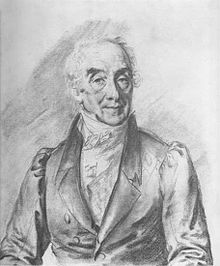Vladimir Grigoryevich Orlov
Vladimir Grigorievich Orlov ( Russian Владимир Григорьевич Орлов ; born July 8 . Jul / 19th July 1743 greg. , † February 28 jul. / 12. March 1831 greg. In Moscow ) was a Russian government official and science manager.
Life
Orlov, the youngest of the five Orlov brothers, was orphaned early and grew up in the country under the care of his brothers. On the day of Catherine II's coronation in 1762, Orlow and his brothers received the hereditary count. In 1763 his brothers sent him abroad to study at the University of Leipzig . He was enthusiastic about astronomy , adored the German scientists and loved life in Leipzig. The French philosophy of the 18th century did not interest him, and he never spoke French.
After his return to St. Petersburg in 1766, Catherine II appointed Orlow to chamberlain (5th class ) and director of the St. Petersburg Academy of Sciences as assistant to the Academy President, Count Kirill Grigoryevich Rasumovsky . In 1767 he accompanied Catherine II on her journey on the Volga to Astrakhan and kept a diary . He translated the 15th chapter of the philosophical novel Bélisaire by Jean-François Marmontel , with which Catherine II herself and persons of her followers struggled.
As director of the academy, Orlov tried to improve the quality of the dilapidated academy. In the minutes of the academy meetings he replaced Latin and German with Russian . He promoted the Russian students and sent them abroad to study. He organized scientific expeditions. In 1769 he sent Stepan Jakowlewitsch Rumowski to Kola , Christoph Euler to Orsk , Wolfgang Ludwig Krafft to Orenburg and Iwan Iwanowitsch Islenjew to Jakutsk to observe the transit of Venus in front of the sun , with Catherine II personally taking part. In St. Petersburg Johann Albrecht Euler , Semjon Kirillowitsch Kotelnikow , Christian Mayer and Anders Johan Lexell observed the transit of Venus, while Georg Moritz Lowitz observed it in Gurjew . The astronomical expedition to Central Asia included Peter Simon Pallas , Samuel Gottlieb Gmelin and Nikolai Petrowitsch Rytschkow .
In 1768 Orlow married Baroness Jelisaveta Ivanovna Stackelberg (1741-1817), daughter of the director of the Livonian Economics College Baron Fabian Adam von Stackelberg and favorite lady of the court Katharinas II, whom he met in 1767 on the Volga trip. Her sister Wilhelmina married the diplomat Reinhold Johann von Rehbinder in 1763 .

In 1770 Orlov was appointed chamberlain (4th class). He made a trip through Russia and kept a diary again. In 1771 he fell seriously ill and traveled abroad for treatment. He lived in Germany , France and England and came into contact with many scientists with whom he then corresponded further. In 1773 he returned to St. Petersburg. In 1774 he resigned at his own request from the service of General Porutschik after the Orlov had lost the favor of Catherine II due to the rise of Grigori Potjomkin's . Orlow settled on his country estate Otrada ( Rajon Stupino ) and had two serf architects build a splendid mansion with a park according to plans by Karl Blank from 1775–1779 . He cared for his family and his serf farmers. He read a lot and observed political and social events.
Orlov had two sons and three daughters. His eldest son Alexander (1769–1787) died early. The eldest daughter Ekaterina married the brigadier Dmitri Alexandrowitsch Novossilzew (1758-1835) in 1799, from whom they separated a year later. Her only son Vladimir (1800–1825) was friends with Count Joseph de Maistre and died in a duel with the Decembrist Konstantin Tschernow. Jekaterina devoted herself to charity and had a mausoleum built on Otrada by Domenico Gilardi (1832–1835). The second daughter Sofja (1774–1844) married the Vice Chancellor Nikita Petrovich Panin in 1790 with the Marfino manor as a dowry and became known for her charity and her care for her serf farmers. The second son Grigori married Countess Anna Ivanovna Saltykowa (1777-1824, daughter of Field Marshal Ivan Petrovich Saltykow and his wife Darja Petrovna nee Tschernyschowa ), who had sold the Marfino manor to her father-in-law Orlov. With his sick wife, Grigori lived constantly abroad and ran a literary salon in Paris . The third daughter Natalja (1782-1819) married the Privy Council (4th class) Pyotr Lwowitsch Davydow . Her son Vladimir Petrovich received the title and name of his grandfather Orlov in 1856, so that he now bore the name Orlov-Dawydow.
Web links
Individual evidence
- ↑ a b c d e f g Орлов, граф Владимир Григорьевич . In: Русский биографический словарь . tape 12 , 1902, pp. 346-347 ( Wikisource [accessed November 3, 2017]).
- ↑ Сухарева О. В .: Кто был кто в России . АСТ, Moscow 2005, ISBN 5-17-023261-6 .
- ↑ Wilhelm Döllen : О прохождениях Венеры через диск Солнца . Типография Императорской Академии наук, St. Petersburg 1870.
- ↑ Ерпылев Н.П .: Развитие звездной астрономии в России в XIX веке . In: Историко-астрономические исследования . tape IV , 1958, p. 27-31 .
- ↑ А. П. Заблоцкий-Десятовский: Взгляд на историю развития статистики в России . In: Записки Русскаго географического общества . tape 2 , 1847, p. 116-135 .
- ↑ Глушкова В .: Усадьбы Подмосковья: история, владельцы, жители, архитектура . Вече, 2011, ISBN 978-5-9533-5205-5 , p. 221-227 .
| personal data | |
|---|---|
| SURNAME | Orlov, Vladimir Grigoryevich |
| ALTERNATIVE NAMES | Орлов, Владимир Григорьевич (Russian) |
| BRIEF DESCRIPTION | Russian civil servant and science manager |
| DATE OF BIRTH | July 19, 1743 |
| DATE OF DEATH | March 12, 1831 |
| Place of death | Moscow |

